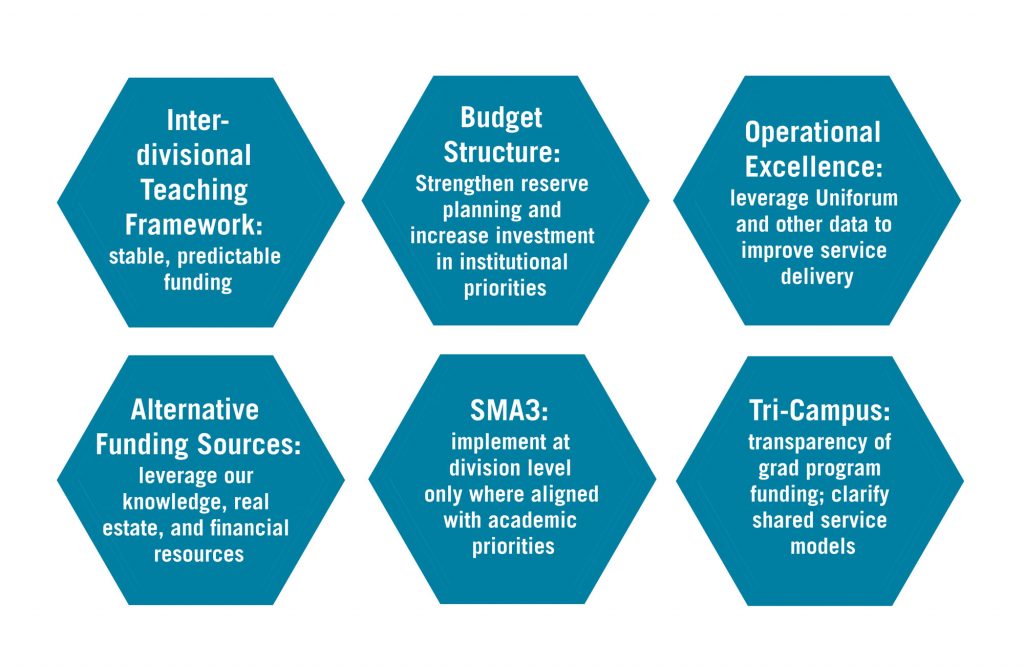The current budget model was adopted in 2007 based on the recommendations of the Task Force to Review Approach to Budgeting. The first review of the budget model, conducted in 2011, concluded that the budget model was serving the University very well and that no significant change in direction was required at the time.
In April 2018, the Provost launched the next periodic review of the University’s Budget Model, noting that this time of change in funding landscape provides an opportunity to address emerging issues and ensure that the budget model will continue to serve the University well into the future. The Budget Model Review concluded in December 2019. The key findings and recommendations from each of the working groups are summarized below:

Steering Committee & Working Groups
The Budget Model Review was guided by a steering committee and initially included five working groups, each with a different mandate. A sixth working group was added in March 2019 to address the Budget Structure & Reserves. The members of the steering committee included:
- Cheryl Regehr, Vice-President & Provost (Co-Chair)
- Scott Mabury, Vice-President, Operations and Real Estate Partnerships & Vice-Provost, Academic Operations (Co-Chair)
- Christopher Yip, Dean, Faculty of Applied Science & Engineering
- Melanie Woodin, Dean, Faculty of Arts & Science
- Sally Garner, Senior Strategist, Operational Initiatives
- Ed Iacobucci, Dean, Faculty of Law
- Ulrich Krull, Vice-President & Principal, University of Toronto Mississauga
- Trevor Rodgers, Assistant Vice-President, Planning & Budget
The six working groups were:
- Strategic Mandate Agreement (SMA) Implementation Committee
- Operational Excellence Working Group
- Alternative Funding Sources Advisory Group
- Tri-Campus Budget Relationships Working Group
- Inter-Divisional Teaching Working Group
- Budget Structure and Reserves Working Group (added in March 2019)
Working Group Recommendations
- The Strategic Mandate Agreement (SMA) Implementation Committee recommended that the performance-based funding mechanism established by the Province not be rolled out in its entirety at the division level. Rather, they recommended that performance-based funding only be applied to divisions where metrics are aligned with the University’s existing academic priorities, and where division-level action can have meaningful impact.
- The Operational Excellence Working Group will continue working beyond the period of the review, and will focus on the use of data from various sources (e.g. Uniforum, COU, U15) to identify opportunities to improve the efficiency and effectiveness of services to divisions.
- The Alternative Funding Sources Advisory Group articulated several potential sources of revenue-generation that take advantage of some of the University’s key strengths: its capacity to create and disseminate knowledge, its real estate holdings and physical infrastructure, and its significant financial capital. Each of the proposed strategies is underpinned by overarching principles that are committed to protecting the University’s reputation, building a pipeline of new ideas, increasing physical capacity and financial flexibility at the institution-level to support divisional collaboration, and ensuring transparent incentives and risk assessment for alternative funding sources.
- The Tri-Campus Budget Relationships Working Group provided additional understanding of the revenue and expenses associated with tri-campus graduate programs, and recommended that each administrative service have a clearly articulated service model to identify the division of responsibility between tri-campus shared service units, academic divisions, and campuses.
- The Inter-Divisional Teaching Working Group developed and rolled out a new financial framework for inter-divisional teaching (IDT) that provides stable, predictable funding for IDT activity, and incorporates a series of bi-lateral discussions of IDT arrangements within the existing annual budget planning process.
The review took place throughout 2018 and into 2019.
Questions about the Budget Model Review can be sent to provost@utoronto.ca

